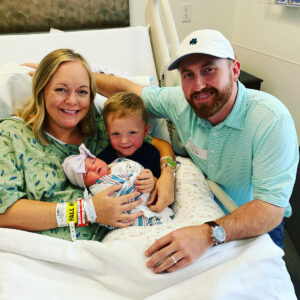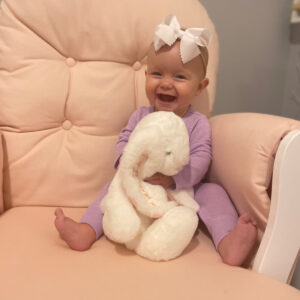
Meet Laura
After Laura and Blaine Martin struggled with infertility for nearly a decade, their prayers were answered when they became pregnant with their first child in 2018. For the most part, Laura’s pregnancy was healthy and normal. After passing her due date, Laura’s OB/GYN scheduled an induction at 41 weeks.
When Laura arrived at the hospital on her induction date, she learned that her baby was in distress. A fetal monitor indicated that the baby’s heartbeat was really shallow. Laura was prepped for an emergency c-section. Less than an hour later, Laura and Blaine welcomed their son Henry.
 Henry spent his first few days of life in the Neonatal Intensive Care Unit to treat his anemia and other complications. But Henry recovered quickly, was discharged home and has since grown into a precious and precocious 3-year -old boy.
Henry spent his first few days of life in the Neonatal Intensive Care Unit to treat his anemia and other complications. But Henry recovered quickly, was discharged home and has since grown into a precious and precocious 3-year -old boy.
After delivery, the Martins learned that Laura’s placenta had abrupted approximately 24 hours before she arrived at the hospital. Among many potentially life-threatening complications, placenta abruption can cause fetal bleeding and
results in the baby and mother’s blood mixing. It can be extremely dangerous for both the baby and the mother. Laura and Henry were both very lucky that she didn’t wait longer to deliver, Henry may not have survived if she had.
A rare blood type and antibody
Last year, Blaine and Laura decided to undergo IVF again and became pregnant with their second child, a girl. At her 10-week check up, she learned that Laura carried a rare antibody as a result of complications during her first pregnancy with Henry.
The antibody developed because Blaine and Henry both have a very uncommon blood type called Kell+. When Laura’s placenta detached, her blood mixed with Henry’s.
This antibody made the pregnancy extremely high risk for both Laura and her unborn daughter. Laura began weekly monitoring for the remainder of her pregnancy. She learned that if her daughter was Kell+, she would have to travel to Houston for her prenatal care and that the only test available to determine her baby’s status was an amniocentesis.
Laura and Blaine were terrified. They were juggling a high-risk pregnancy and caring for their growing toddler all during a global pandemic. The prospect of leaving home to travel to Houston every week for testing and care was insurmountable.
Hope at Home
Then Laura learned that Dr. Ken Moise had joined Dell Children’s to launch the Comprehensive Fetal Care Center (CFCC), and that he was the preeminent expert on her rare disorder.
Laura was one of the very first patients at the CFCC in the Dell Children’s Specialty Pavilion last spring. At her first appointment, Dr. Moise explained his plan of care to Laura and Blaine and walked them thoughtfully through each step. Laura remembers how this visit gave her such comfort that she was in the right place for her and her daughter.
Dr. Moise offered an alternative to the amniocentesis test too. Instead her blood sample was shipped to an international lab with capacity to test less invasively. Her results confirmed that her baby’s blood type was also Kell positive and Laura’s antibody that she acquired during her first pregnancy would put her unborn daughter at risk by attacking her Kell positive blood cells.
 One week later, Laura was scheduled for her first intrauterine blood transfusion with Dr. Moise. Laura gave Dr. Moise permission to allow observers for the procedure and remembers being “blown away” at all of the people watching that day.
One week later, Laura was scheduled for her first intrauterine blood transfusion with Dr. Moise. Laura gave Dr. Moise permission to allow observers for the procedure and remembers being “blown away” at all of the people watching that day.
“I quickly realized that they all wanted to learn from Dr. Moise,” said Laura, “I knew once again I was in good hands.”
Laura had two more intrauterine blood transfusions and her daughter, Ada, was born via planned c-section at 38 weeks. Dr. Moise had cautioned Laura that Ada could be born with severe jaundice or need a blood transfusion immediately after birth, but Ada was healthy. She didn’t need her first transfusion until 3 weeks old.
The Dell Children’s Difference
 Dr. Moise collaborated with Dr. Cohn in the Dell Children’s Blood and Cancer Center (CBCC). All of Laura and Ada’s care could take place in one building just a few minutes from their home.
Dr. Moise collaborated with Dr. Cohn in the Dell Children’s Blood and Cancer Center (CBCC). All of Laura and Ada’s care could take place in one building just a few minutes from their home.
“I was so lucky that the Pavilion was open when all of this happened. I went to the first floor to see Dr. Moise each week and then walked up to the 2nd to see Dr. Cohn for Ada’s testing.”
At three months old, Ada was released from the CBCC. She is now a healthy, happy 22-month-old girl who is working on sitting up and learning to crawl.
Ada has gone through so much in her short life, says Laura, but she is the most “carefree and happy baby.”
Laura is forever grateful to Dr. Moise, the Comprehensive Fetal Care Center and Dell Children’s for helping her bring Ada safely into the world.
 “If I had to travel to Houston, I would have been a mess, driving back and forth every week, managing childcare for my son, my husband would have had to take off more time from work, it would have been unfamiliar and even scarier. There’s no telling what could have happened.”
“If I had to travel to Houston, I would have been a mess, driving back and forth every week, managing childcare for my son, my husband would have had to take off more time from work, it would have been unfamiliar and even scarier. There’s no telling what could have happened.”
But, Laura stresses, it was more than just the proximity for her family.
“At every ultrasound, the team would call Ada by her name, they treated her like a real person before she was even born. Dr. Moise would call me personally after an appointment to just check in. He is someone I will never forget,” said Laura. And for expectant mothers on a similar path, Laura offers this advice, “If you have a rare condition, go straight to Dr. Moise and Dell Children’s, the humongous burden will be lessened, you may be scared, but you will be treated like family and wrapped in care.”
